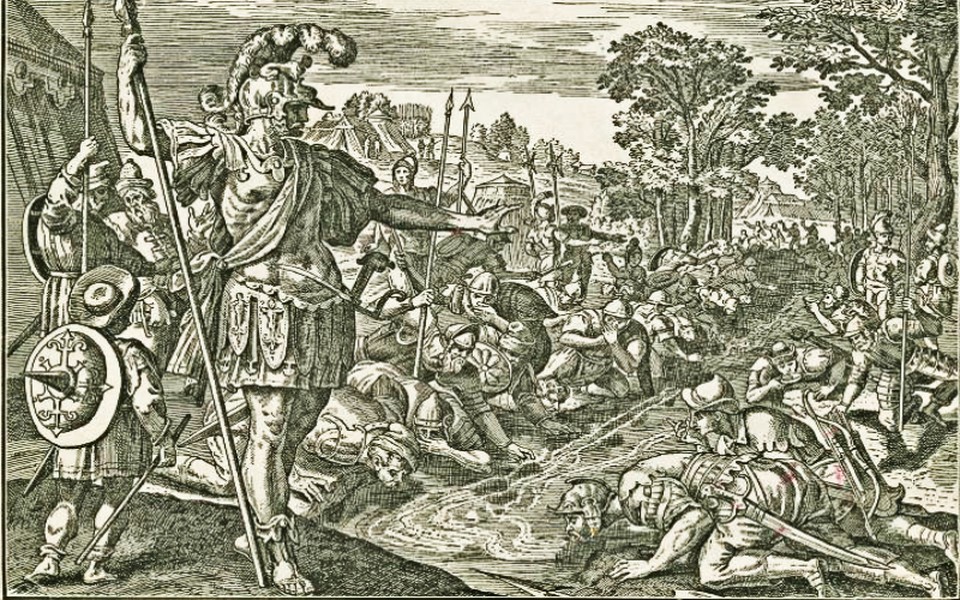The Child Who Raised an Army

During summer visits to the family farm back in rural North Dakota, I encountered some of the most exciting Bible stories in my Aunt Betty’s Sunday school class. Up on her top 40 was the story of Gideon and his victory over the Midianites—golden moment, golden hero, golden example. But when I learned Hebrew as an adult, I found out that Gideon was anything but a poster child saint.
A Little Coy about the Crown
A noble speech and a happy ending frame some shocking events in Judges 8:22-35. Gideon sounds like a saint when he refuses the offer to rule over Israel (8:22–23), but he sounds like a villain when he takes up a collection of gold, makes an ephod, and leads Israel astray with it (8:24–27). In spite of it all, war ceases after Gideon’s work (8:28). By the time Gideon’s 70 sons and many wives are mentioned, his son Abimelech seems like a pointless detail on the way to Gideon’s eulogy about “all the good he had done to Israel” (8:30–35).
Abimelech’s name isn’t trivial. It contains a fascinating contradiction. Gideon steadfastly refused to rule Israel (8:23), and then gave one of his sons a name that means “My father is king” (אבימלך, abimelekh; 8:31). In ancient Near Eastern cultures, personal names were more than a label. They were often compressed sentences that included references to deities or ancestors—a sort of ancient advertising. You can look up the meaning of a name using the ESV Hebrew-English Reverse Interlinear. This will get you to the underlying Hebrew word, which you can then look up in Brown-Driver-Briggs Hebrew and English Lexicon. The dictionary will tell you the name’s meaning and the words that comprise the name.
What’s in a Name?
What happened? Why would someone like Gideon seemingly refuse kingship and then name his child “My father is king”? Gideon’s words in Judges 6:15 hold the best clue: “Please Lord, how can I save Israel? Behold, my clan is the weakest in Manasseh, and I am the least in my father’s house.” Gideon was convinced that he didn’t have enough power. Gideon’s initial response to God empowering him is to raise an army (6:35). The Lord has to pare down the army to emphasize His power and not human might (7:1–8). Even at the height of his success, Gideon couldn’t avoid self-aggrandizement: “For the Lord and for Gideon” (7:18, 20). He even becomes vindictive against his own people when they refuse to help him (8:5–9, 15–17).
Gideon centered worship in his hometown by placing the symbol of the priesthood, the ephod, in Ophrah (Judg 8:27). The Tyndale Bible Dictionary tells us that an ephod is a garment that a priest wears when seeking messages from a deity (Exod 28:6–14). Sometimes, though, an ephod was a covering placed on an idol (see Judges 17–18).
The Mighty Fall
It’s ironic that much of the good that Gideon did for Israel was undone by his son Abimelech (Judg 9). Almost all of Gideon’s strategies for increasing his power were swept away. The problem with Gideon wasn’t what happened; it was what didn’t happen—he couldn’t change his perspective.
We all have skewed ideas about how our lives should look so that we can do what God wants us to do. God accomplished good through Gideon by decreasing Gideon’s power. But Gideon never seemed to understand that.
The Sunday school Gideon is a good example, and his faith and courage are worth imitating. The rest of the story shows how Gideon’s life and work were damaged by his own misperceptions. That’s an example to avoid. It’s nice to know that the Bible is something that I can grow into rather than grow out of.
» QUICKBITS:
The Great Baal Out
The deity Baal acquired arch-villain status as the rival to exclusive Yahweh worship in Israel. After tearing down his father’s altar to Baal, Gideon acquired the nickname, Jerubbaal (ירבעל, yerubba’al). Most embedded deity references are meant to honor the deity, but this name insults Baal: “Let Baal contend.”
Successive biblical writers seem uncomfortable with any reference to Baal. They scrambled references to Baal under the Hebrew word bosheth (בשׁת, “shame”). Thus, you have “Abimelech son of Jerubbesheth” in 2 Samuel 11:21. The transformation goes like this: Jerubbaal (ירבעל, yerubba’al), meaning “Let Baal contend,” to Jerub-bosheth (ירבשׁת, yerubbesheth), meaning “shame will contend.” It’s impossible to know the motivations behind such a switch, but marking reoccurring apostasy with a word like “shame” makes sense.
You can order the Enhanced Brown-Driver-Briggs Hebrew and English Lexicon at Logos.com/BDB.

Photo credit: GettyImages
Originally published March 11, 2014.







